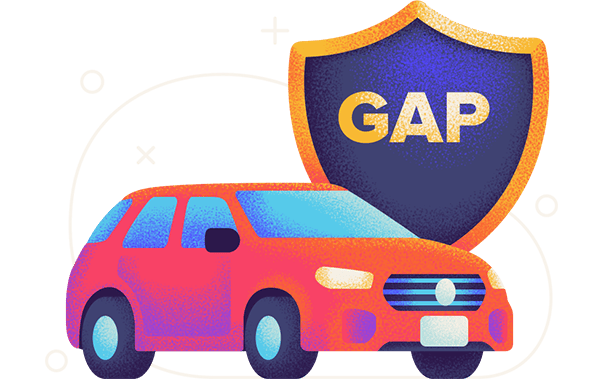Understanding GAP Insurance: Protecting Your Finances Beyond Standard Auto Coverage
Posted Monday, Jul 24, 2023

When purchasing a new car, many people focus on selecting the perfect make and model, negotiating the price, and securing the best financing options. However, one crucial aspect of car ownership often gets overlooked - insurance coverage.  While most individuals are familiar with standard auto insurance, there is an additional policy that can provide invaluable protection: GAP insurance.
While most individuals are familiar with standard auto insurance, there is an additional policy that can provide invaluable protection: GAP insurance.
GAP insurance, short for Guaranteed Asset Protection insurance, is a type of coverage that fills the gap between what you owe on your car loan and the actual cash value of your vehicle in the event of a total loss. It comes into play when your car is stolen or totaled in an accident, and the cost of repairing the damages exceeds the car's value. In such unfortunate scenarios, standard insurance policies only reimburse the current market value of the vehicle, leaving you responsible for the outstanding loan balance. This is where GAP insurance steps in to save the day.
How Does GAP Insurance Work?
To better understand the benefits of GAP insurance, let's look at an example scenario:
Imagine you just purchased a brand-new car for $30,000, and you financed it with a car loan. Unfortunately, only a few months after driving your new vehicle, you're involved in a severe accident that renders the car beyond repair. Your insurance company determines that the current market value of the car is $25,000, leaving you with a $5,000 deficit between the insurance payout and the amount you still owe on your car loan.
This is where GAP insurance kicks in. Instead of being stuck with the $5,000 difference, GAP insurance covers that amount, ensuring that you're not financially burdened by the remaining loan balance. In essence, it prevents you from having to pay for a vehicle that no longer exists.
The Benefits of GAP Insurance:
Debt Protection: The primary advantage of GAP insurance is protecting you from being responsible for loan payments on a car that is no longer usable. It saves you from potential financial hardship by covering the difference between the insurance payout and the outstanding loan balance.
New Car Depreciation: Cars, especially new ones, often depreciate quickly in the first few months of ownership. GAP insurance becomes particularly beneficial during this period, as it covers the depreciation gap between the initial purchase price and the current value.
Total Loss and Theft Coverage: Comprehensive insurance policies typically cover theft and accidents that result in a total loss, making GAP insurance an excellent complement to your standard coverage.
Affordability: GAP insurance is relatively affordable, with premiums often being a one-time fee or a low monthly cost when added to your car loan.
Peace of Mind: Knowing that you're protected from substantial financial losses in the event of an accident can bring peace of mind and reduce stress associated with car ownership.
Is GAP Insurance for Everyone?
 While GAP insurance offers compelling benefits, it may not be necessary for everyone. Individuals who buy a car outright with cash or make a significant down payment that covers the initial depreciation of the vehicle might find it less crucial. However, for individuals who finance a car with a small down payment or opt for a longer-term loan, GAP insurance is highly recommended. Similarly, if you drive a lot or have a history of accidents, the likelihood of being in an accident leading to a total loss or theft increases, making GAP insurance a wise investment.
While GAP insurance offers compelling benefits, it may not be necessary for everyone. Individuals who buy a car outright with cash or make a significant down payment that covers the initial depreciation of the vehicle might find it less crucial. However, for individuals who finance a car with a small down payment or opt for a longer-term loan, GAP insurance is highly recommended. Similarly, if you drive a lot or have a history of accidents, the likelihood of being in an accident leading to a total loss or theft increases, making GAP insurance a wise investment.
Conclusion:
In conclusion, while standard auto insurance is essential for protecting your vehicle, adding GAP insurance to your coverage can provide an extra layer of financial security. It ensures that you won't find yourself in a difficult financial position if your car is stolen or declared a total loss after an accident. The relatively low cost of GAP insurance compared to its potential benefits makes it a worthwhile consideration for many car owners. Always explore your options, read the fine print, and consult with insurance professionals to determine if GAP insurance is the right fit for your individual needs and circumstances. Remember, being prepared today can save you from potential financial hardship tomorrow.
